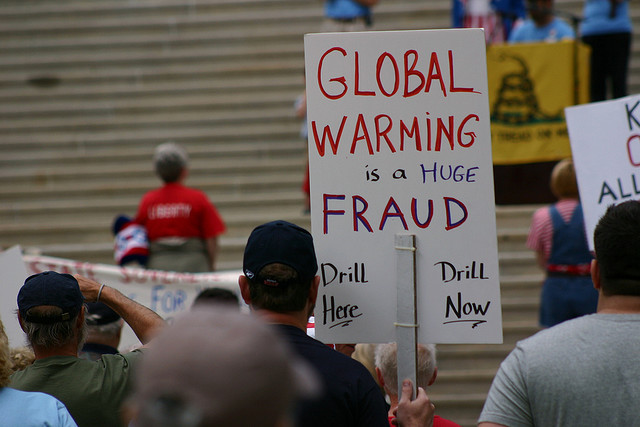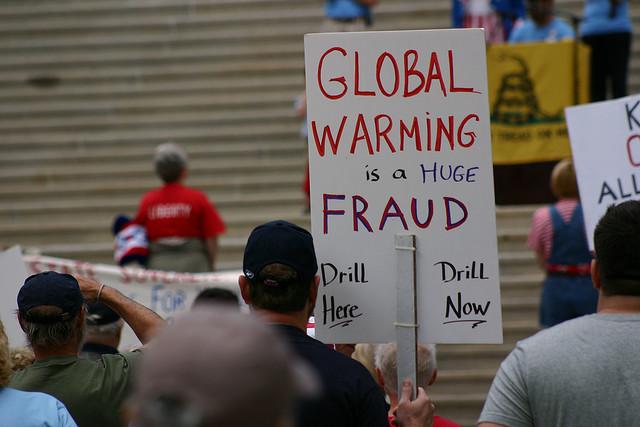 Photo: Flickr via bvcphoto
Photo: Flickr via bvcphoto
Okay, so it shouldn’t come as a surprise that Tea Party supporters are more dubious about global warming than the rest of the American public. But 14 percent? That means more Tea Party boosters believe Barack Obama is a Muslim than that global warming is something to worry about.
See no evil: The 14 percent figure comes from a New York Times/CBS News poll which also found that more than half the Tea Party supporters surveyed don’t think global warming will ever have a serious effect on the planet. That compares to 15 percent of non-Tea Party Americans who also feel that way.
As John Broder’s article in today’s New York Times points out, organizations that work closely with Tea Party groups, such as Americans for Prosperity and FreedomWorks, have deep roots in the oil industry. Here’s what FreedomWorks has to say about federal climate policy:
Any effort to make electricity and fuel more expensive or to cap or regulate CO2 will only exacerbate an already critical situation and cause tremendous economic damage.
For its part, Americans for Prosperity describes cap-and-trade as the “largest excise tax in history.”
And in other green news:
It’s in the tars: Sounds like the State Department will be approving that TransCanada pipeline which will carry tar-sands-based crude oil from Alberta, Canada all the way through the U.S. to refineries in Texas. Secretary of State Hillary Clinton says the controversial project is likely to get the go-ahead next year, although she presents it as a kinda necessary evil.
The U.S is either going to be dependent on dirty oil from the Gulf or dirty oil from Canada … until we get our act together as a country and figure out that clean, renewable energy is both in our economic interests and the interests of the planet. [The Hill]
Southern discomfort: Nine states in the Southeast and lower Midwest are suffering through what’s described as an “extreme drought” and climatologists fear that the dry conditions could last into spring and even worsen next summer. Memphis, for instance, has had only .01 inches of rain this month [Wall Street Journal]. A recent study concluded that extreme drought around the world could bring the most damaging consequences of climate change.
Rare necessities: Yesterday we reported that China was planning to start reducing its export of rare-earth metals — not exactly good news because those metals are key to producing so many renewable energy products, from wind turbines to electric car batteries. Now China says that’s not so, that it will “continue to supply rare earth to the world.” One thing that hasn’t changed is that China produces as much as 90 percent of the world’s rare-earth metals, which gives it tremendous leverage in the renewable energy market. [Bloomberg]
What kind of fuel am I?: The U.S. Chamber of Commerce, which has been out leading the charge against climate and energy legislation, is now working with education publisher Scholastic, Inc. to produce a teaching guide for middle school students. One of the questions it asks: “What do you think could happen if one of our energy sources was suddenly unavailable (e.g., power plant maintenance, government curb on production, etc.)?” The Chamber insists it has no hidden agenda. [Politico]
Slick and tired: Three environmental groups — Defenders of Wildlife, the Gulf Restoration Network, Inc., and the Save the Manatee Club, Inc. — have sued BP for the toll its oil leak has taken on wildlife in the Gulf. [AP]
The answer, my friend, is floating in the wind: The idea of building floating wind turbines to take advantage of stronger winds in deep water far out at sea is picking up steam. A new study concludes that they are “both technically and economically feasible.” [Clean Technica]
A grow blow: That’s good to hear because another study found that the growth of more trees is actually slowing wind speeds in the northern hemisphere. And that could mean less energy produced by wind turbines on land. [New Scientist]
A thin win: Researchers at MIT say it won’t be long before paper-thin solar cells that can be printed on anything from window blinds to laptops arrive in the marketplace. [Discovery News]
Fire up the popcorn: Clearly you’re a busy person and you haven’t had a chance to see all the campaign ads about climate and energy. The folks at Ecopolitology are here to help. The group has pulled together the best and worst from this campaign season. Take a look.



